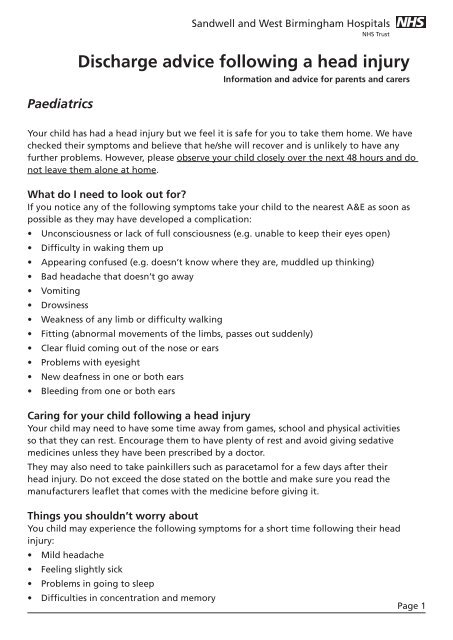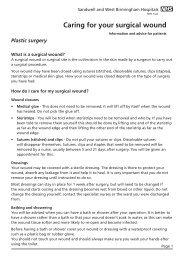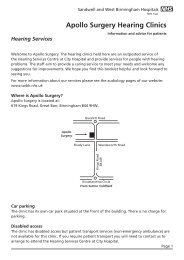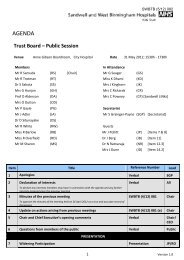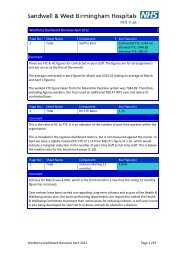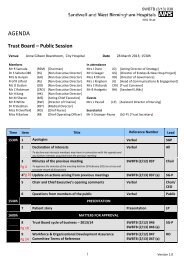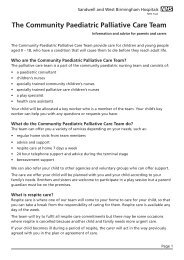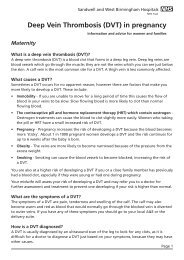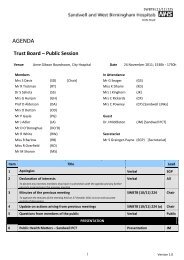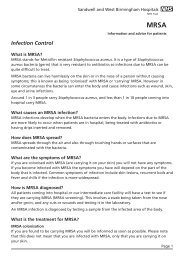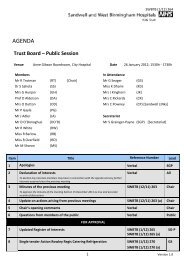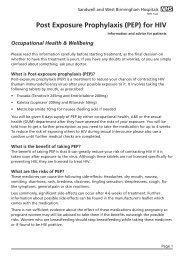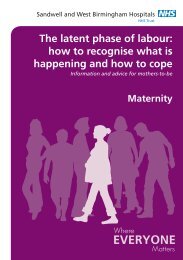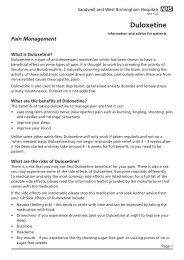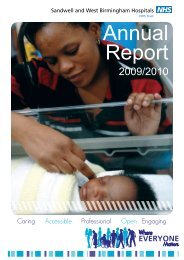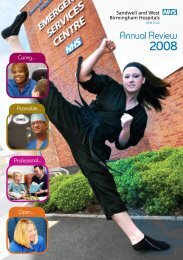Discharge advice following a head injury - Sandwell & West ...
Discharge advice following a head injury - Sandwell & West ...
Discharge advice following a head injury - Sandwell & West ...
You also want an ePaper? Increase the reach of your titles
YUMPU automatically turns print PDFs into web optimized ePapers that Google loves.
Paediatrics<br />
<strong>Discharge</strong> <strong>advice</strong> <strong>following</strong> a <strong>head</strong> <strong>injury</strong><br />
Information and <strong>advice</strong> for parents and carers<br />
Your child has had a <strong>head</strong> <strong>injury</strong> but we feel it is safe for you to take them home. We have<br />
checked their symptoms and believe that he/she will recover and is unlikely to have any<br />
further problems. However, please observe your child closely over the next 48 hours and do<br />
not leave them alone at home.<br />
What do I need to look out for?<br />
If you notice any of the <strong>following</strong> symptoms take your child to the nearest A&E as soon as<br />
possible as they may have developed a complication:<br />
• Unconsciousness or lack of full consciousness (e.g. unable to keep their eyes open)<br />
• Difficulty in waking them up<br />
• Appearing confused (e.g. doesn’t know where they are, muddled up thinking)<br />
• Bad <strong>head</strong>ache that doesn’t go away<br />
• Vomiting<br />
• Drowsiness<br />
• Weakness of any limb or difficulty walking<br />
• Fitting (abnormal movements of the limbs, passes out suddenly)<br />
• Clear fluid coming out of the nose or ears<br />
• Problems with eyesight<br />
• New deafness in one or both ears<br />
• Bleeding from one or both ears<br />
Caring for your child <strong>following</strong> a <strong>head</strong> <strong>injury</strong><br />
Your child may need to have some time away from games, school and physical activities<br />
so that they can rest. Encourage them to have plenty of rest and avoid giving sedative<br />
medicines unless they have been prescribed by a doctor.<br />
They may also need to take painkillers such as paracetamol for a few days after their<br />
<strong>head</strong> <strong>injury</strong>. Do not exceed the dose stated on the bottle and make sure you read the<br />
manufacturers leaflet that comes with the medicine before giving it.<br />
Things you shouldn’t worry about<br />
You child may experience the <strong>following</strong> symptoms for a short time <strong>following</strong> their <strong>head</strong><br />
<strong>injury</strong>:<br />
• Mild <strong>head</strong>ache<br />
• Feeling slightly sick<br />
• Problems in going to sleep<br />
• Difficulties in concentration and memory<br />
Page 1
Paediatrics<br />
<strong>Discharge</strong> <strong>advice</strong> <strong>following</strong> a <strong>head</strong> <strong>injury</strong><br />
Information and <strong>advice</strong> for parents and carers<br />
• Lack of appetite<br />
• Tiredness<br />
You do not need to worry about these symptoms unless they do not go away, in which case<br />
you should contact your GP.<br />
Are there any delayed complications of a <strong>head</strong> <strong>injury</strong>?<br />
Usually children recover quickly from their <strong>injury</strong> and do not experience any long-term<br />
problems. Very occasionally, some children develop complications over the weeks and months<br />
after their <strong>head</strong> <strong>injury</strong>. If you are worried about any symptoms your child has please contact<br />
your GP as soon as possible for <strong>advice</strong>.<br />
Further information<br />
For health information and <strong>advice</strong> 24 hours a day you can contact:<br />
NHS Direct<br />
0845 46 47<br />
For more information about <strong>head</strong> injuries please see:<br />
NHS Choices<br />
www.nhs.uk/conditions/<strong>head</strong>-<strong>injury</strong>-minor<br />
For more information about our hospitals and services please see our website:<br />
<strong>Sandwell</strong> and <strong>West</strong> Birmingham Hospitals NHS Trust<br />
www.swbh.nhs.uk<br />
Sources used for the information in this leaflet<br />
National Institute for Health and Clinical Excellence, CG56 ‘Head <strong>injury</strong>: triage, assessment,<br />
investigation and early management of <strong>head</strong> <strong>injury</strong> in infants, children and adults’,<br />
September 2007<br />
If you would like to suggest any amendments or improvements to this leaflet please contact the<br />
communications department on 0121 507 5420 or email: swb-tr.swbh-gm-patient-information@nhs.net<br />
A Teaching Trust of The University of Birmingham<br />
Incorporating City, <strong>Sandwell</strong> and Rowley Regis Hospitals<br />
© <strong>Sandwell</strong> and <strong>West</strong> Birmingham Hospitals NHS Trust<br />
ML3555<br />
Issue Date: May 2012<br />
Review Date: May 2014<br />
Page 2


